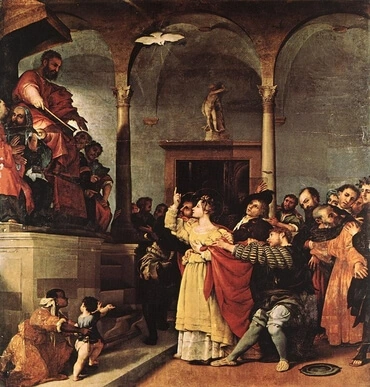1
Når Efra'im talte, blev alle redde; han raget høit op i Israel; da førte han skyld over sig ved å dyrke Ba'al og døde.
2
Og nu blir de ved å synde og gjøre sig støpte billeder av sitt sølv, avguder efter sin egen forstand, alle sammen håndverkeres arbeid; sådanne er det de taler til - mennesker som ofrer, kysser kalver!
3
Derfor skal de bli som en morgensky, lik duggen som tidlig svinner bort, lik agner som vinden fører bort fra treskeplassen, og som røk fra et røkfang.
4
Men jeg er Herren din Gud fra Egyptens land, og nogen annen Gud enn mig kjenner du ikke, og nogen annen frelser finnes det ikke.
5
Det var jeg som sørget for dig i ørkenen, i det brennhete land.
6
Fordi deres beite var godt, blev de mette; og da de blev mette, ophøiet de sig i sitt hjerte, og så glemte de mig.
7
Da blev jeg mot dem som en løve; som en leopard lurer jeg ved veien;
8
jeg vil møte dem som en bjørn som ungene er tatt fra, og sønderrive deres hjertes dekke*; jeg vil fortære dem som en løvinne; markens ville dyr skal sønderslite dem. / {* d.e. deres bryst.}
9
Det er blitt til din ødeleggelse, Israel, at du har satt dig op imot mig, jeg som er din hjelp.
10
Hvor er da din konge, at han skulde kunne frelse dig i alle dine byer, og dine dommere, om hvem du sa: Gi mig en konge og fyrster?
11
Jeg gir dig en konge i min vrede, og jeg tar ham bort igjen i min harme.
12
Efra'ims misgjerning er samlet i en pung, hans synd er gjemt.
13
Veer som hos en fødende kvinne skal komme over ham. Han er en uforstandig sønn; når tiden er der, kommer han ikke frem i modermunnen.
14
Av dødsrikets vold vil jeg fri dem ut, fra døden vil jeg forløse dem. Død! Hvor er din pest? Dødsrike! Hvor er din sott? Anger er skjult for mine øine*. / {* jeg angrer ikke hvad jeg har lovt; 4MO 23, 19.}
15
For han brer frukt*, der han står blandt sine brødre; men det kommer en østenvind, et Herrens vær, som drar op fra ørkenen, og hans brønn blir tom, og hans kilde tørkes ut; den** røver den hele skatt av kostelige ting. / {* 1MO 48, 19; 49, 22.} {** østenvinden, d.e. assyrerne; HSE 4, 19.}







